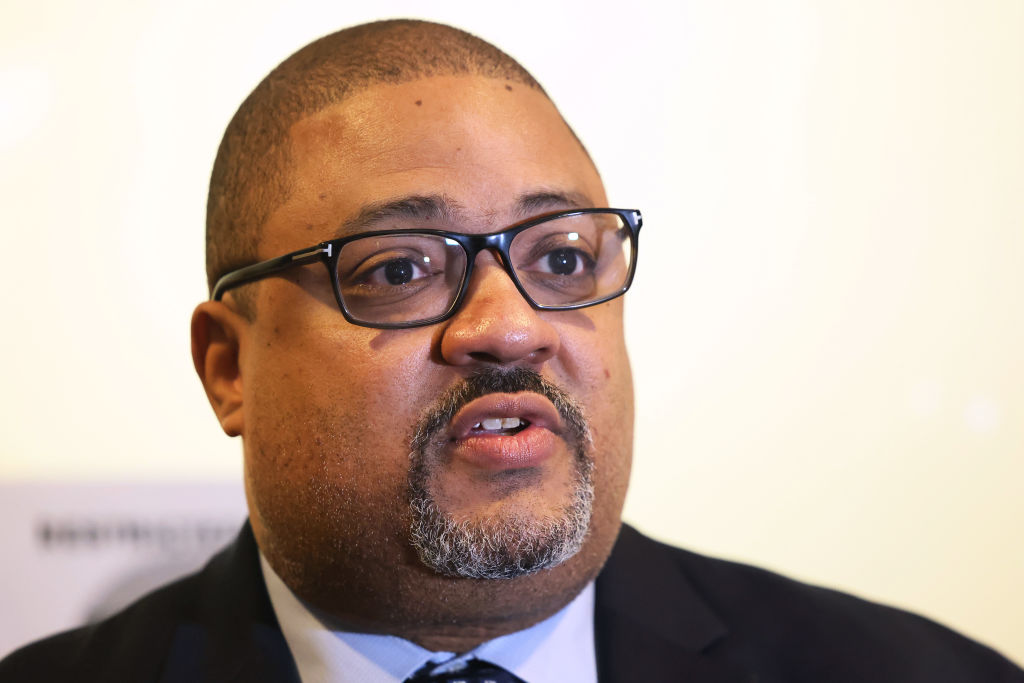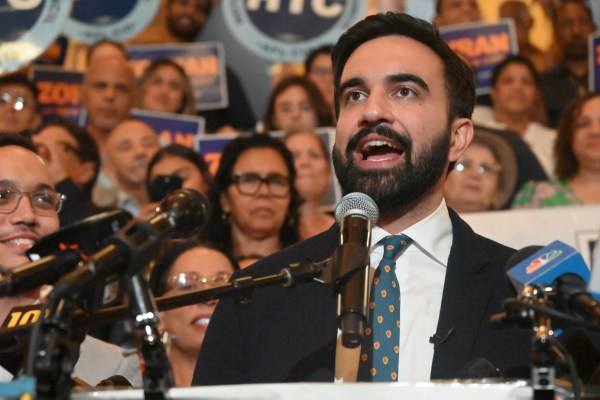Yesterday a fellow Dispatch-er posed a challenging question in the company Slack channel. Imagine that a rogue prosecutor bent the law in order to nab a bad guy, this person asked, apropos of nothing in particular. What role should Congress play in remedying that injustice?
I’m inclined to answer: None whatsoever—in the near term, at least. Especially if the rogue in question is a state prosecutor rather than a federal one.
The question was inspired, obviously, by the letter three House Republican committee chairmen sent to Manhattan District Attorney Alvin Bragg as he prepares to prosecute The Porn Star Payoff Heard ‘Round The World. Bragg’s office doesn’t receive much federal funding and what it does receive goes mostly toward supporting programs for crime victims, not toward local prosecutions. But somehow that was enough of a federal nexus for Reps. Jim Jordan, James Comer, and Bryan Steil to start making demands of the DA.
They want him to provide documents and communications between his office and arms of the federal government since 2017 related to the Stormygate investigation of Donald Trump. And they want him to testify before their committees to help “advance our oversight and to inform potential legislative reforms” pertaining to, among other things, how much leeway state prosecutors should have to bring charges in matters where federal prosecutors have declined to do so.
All three would call themselves federalists, no doubt, but then all three also call themselves conservatives. Labels don’t mean much anymore in a party that takes devotion to Donald Trump as its highest virtue.
You will search in vain in the letter sent by Jordan, et al., for any claim that Bragg’s prosecution of Trump is illegal. The case is based on a novel legal theory, the three allege. (True.) If that theory falls apart under judicial scrutiny, the prosecution could be barred by the statute of limitations. (True.) The star witness, former Trump lawyer Michael Cohen, is a convicted perjurer. (True.) The timing of the looming indictment plus the fact that other prosecutors opted not to charge Trump in the matter makes the whole thing reek of politics. (True.)
It’s quite “sketch,” as the kids might say, and I myself have said so repeatedly. But so is the House majority barging into a live criminal case to rhetorically grab the lead prosecutor by the scruff of the neck before he dares make trouble for their cult leader. If you think Bragg is guilty of abusing his office for nakedly partisan purposes, precisely what are Jordan, Comer, and Steil guilty of?
One party using its federal legislative power to try to short-circuit a state prosecution of an influential member strikes me as more alarming than what a given district attorney might be up to, even a powerful one like Bragg. If nothing else, it’s a case of fighting tyranny with tyranny.
Which, in fairness to Jordan, et al., is at least true to the spirit of post-liberal conservatism.
Start with this: Jordan, Comer, and Steil sent their letter before anyone has seen the indictment.
They’re not responding to facially ludicrous criminal charges or weak evidence. They’re firing a last-second shot across Bragg’s bow based on guesswork to try to intimidate him into not charging Trump at all. And not just him: The fact that Trump might soon face state charges in Georgia and federal charges over January 6 looms over the House GOP’s power play toward Bragg. This is a warning to all prosecutors to keep their hands off the golden calf, especially those at the Department of Justice whose funding depends on Congress’ largesse.
It’s a preemptive strike rather than a “remedy” for injustice. And it’s premised on the belief that Bragg’s reasoning for why Trump’s hush-money payoff amounts to a felony is, and can only be, illegitimate.
I think it’s a grievous mistake for the DA to test out “novel” legal theories in a matter as politically charged as prosecuting a former/future president with a fanatic following. But the fact that it’s novel doesn’t mean it won’t stand up on appeal. If the speculation is correct, Bragg intends to argue a) that Trump committed a misdemeanor when his company filed false reports alleging that his hush-money reimbursement of Michael Cohen was for legal expenses and b) that misdemeanor blossomed into a felony because it involved a second crime, a de facto campaign contribution over the legal limit under federal and New York campaign finance law.
Assume that theory of a second crime is ratified by New York’s high court, or even the U.S. Supreme Court. If Trump is found guilty, by what logic is his conviction illegitimate?
The prosecution would still be a terrible idea for prudential reasons, as the political nature of it will shake the public’s faith in the impartiality of the justice system. It may seem unjust, too, inasmuch as many of us would blanch at ordering jail time for a sin as venial as paying a mistress to keep quiet. (Yes, granted, technically the relevant sin is violating financial disclosure laws, but that’s not how the moral calculus will work.) As a legal matter, though, if Bragg has the goods and his legal theory is sound, there’s nothing inherently outrageous about Trump being held accountable for what he did.
In fact, in a previous political lifetime, Trump’s current lawyer acknowledged that the facts in this case might amount to a crime.
When we look at it that way, the House’s intervention in the matter seems that much more extraordinary. Why should Bragg need to come before Congress to defend a possibly meritorious prosecution, involving a crime which a grand jury found probable cause to charge, when egregious examples of prosecutorial misconduct in other jurisdictions never attract meaningful federal scrutiny?
Next: Why assume that the judiciary is unfit to deal with Bragg’s questionable prosecution such that congressional intervention is warranted?
To believe that Bragg’s novel legal theory will be blessed on appeal by local courts for raw partisan reasons, you need to adopt the MAGA theory that all Democratic-appointed or Democratic-elected judges are liberal hacks who’ll ratify any manner of corruption in the name of getting Trump. Including, incidentally, the conservative-dominated U.S. Supreme Court, which might have the final say in this matter if Trump can find a constitutional argument against his prosecution.
I made the point yesterday but will restate it here that few defendants in a criminal case will ever have as much going for them as he does in this matter. Bragg’s case does stink of politics and appellate judges are destined to consider that, I suspect, when weighing whether his novel legal theory of Trump’s guilt is a little too conveniently novel. Trump has money to burn in mounting his defense and has already launched one of the most vicious PR counteroffensives in a criminal case that any of us will ever see. If he’s convicted, he’ll probably avoid jail time for fear of the public unrest that might result or the weird logistical hurdles that jailing him would present, like how his Secret Service detail would function while he’s behind bars.
To make the case that the federal legislature urgently needs to intervene in a criminal matter to secure justice, we should first make the case that state courts are unequal to the task. What is that case? Give me something stronger than “Well, Judge XYZ was appointed by Andrew Cuomo.” Because if that’s the argument, corrupt Democratic politicians who end up on trial—which does happen from time to time—can never get a fair hearing in a red state. Or from John Roberts’ Supreme Court.
The courts aren’t the only check on Bragg. There are others, although admittedly more in theory than in practice.
The governor of New York has authority to oust district attorneys who abuse their power. Neither you nor I expect Kathy Hochul to object to a dubious prosecution of Donald Trump, but her next Republican challenger will stand a nonzero chance of winning and might regard this episode as one of many grounds to get rid of the DA. The liberal voters of Manhattan will render their own verdict on Bragg in two years, and while they also won’t take issue with prosecuting Trump in the abstract, they might question the DA’s competence if Trump beats the rap—a feasible outcome.
More than that, they might find themselves silently agreeing with the GOP’s point that a prosecutor who seems more intent on jailing Trump for paying hush money than jailing violent criminals is a prosecutor who’s lost the plot. (Bragg’s defenders are keen to push back on that point this week.) As much as Manhattanites hate Trump, I guarantee that he’s not a higher priority for them than public safety is. It wasn’t anti-Trumpism that got Eric Adams elected mayor, and it isn’t Trumpism that might get Adams thrown out of office.
There are other institutional actors who could intervene. Should evidence of real corruption within Bragg’s office emerge in connection with Trump’s prosecution, the Department of Justice or New York State Attorney General’s Office might have something to say about it. All told, that means executive and judicial and democratic checks are in place potentially to deter the DA from true misconduct. Hell, there’s even a legislative check available in the form of New York’s lousy state Senate and state Assembly, which might in principle be roused to action if a scandal around Bragg got big enough.
You can anticipate the MAGA reply to all of that: We don’t control any of those entities. The courts, the agencies, even the people in New York are Democratic. The House is the only thing we have.
Which is what this is all about, isn’t it?
Back when they pretended to care about federalism and government overreach, serious conservatives would begin any deliberation over federal action by asking two questions. Does the federal government have constitutional authority to act in this matter? If it does, would a lower level of government that’s more responsive to the relevant constituency act more effectively?
Those questions are out the window in Trump’s case, as they often are when there’s something he covets. Whether interrupting a live criminal case to make a spectacle of the prosecutor is proper or not, whether the state courts in New York are better suited to checking Bragg’s abuse of discretion or not, the House needs to act because it’s the only lever of government Republicans control at the moment.
It’s the same logic that’s driving populist yahoos to demand that Ron DeSantis defy any extradition request from New York for Trump even though Article IV, Section 2 of the Constitution compels him to comply. If you hold state power, the modern right expects you to wield it on behalf of your friends and against your enemies and worry about the legal niceties and precedents you’re setting later. They have that much in common, at least, with Alvin Bragg.
Case in point: Here’s the leading “libertarian” in the Senate calling for Bragg to be jailed for some unspecified reason.
Whether Paul thinks the DA deserves a trial and due process before being tossed in the slammer or whether he should proceed directly to jail without passing “Go” is unclear. Even the “constitutionalists” in the party don’t worry about legal niceties anymore.
Having said all that, there might be a role for Congress in this—eventually.
There should be no role in the near term. Bragg’s case should play out without political interference to avoid mainstreaming expectations that the House will leap into action anytime some politically sensitive constituent of the majority is threatened legally. If an ambitious Republican prosecutor in a red state aggressively charges people arrested during the Black Lives Matter protests in 2020, I don’t want a Democratic-controlled Congress disrupting that process by dragging him before the House to grandstand at his expense. The more that happens, the more the two parties’ respective bases will come to insist on it, the more prosecutors will begin to include it into their charging calculations, and the more some politically tapped-in miscreants will end up avoiding jail time that they deserve.
“We’re sympathetic to the defendant and his politics” just ain’t enough to warrant an urgent congressional inquiry aimed at discrediting or blowing up a live criminal case, even if there’s a dubious federal nexus that might technically justify it. Frankly, if I’m right that Trump stands a good chance of acquittal or of getting the charges dropped, it’s in the GOP’s interest not to delegitimize that outcome by meddling with Bragg before it happens.
Once the case is over, hauling him in to explain himself would be less objectionable. This prosecution is political, after all, and at the expense of a viable presidential candidate no less. The DA deserves some public scrutiny. Just not a moment when doing so risks obstructing justice.
A counterargument for immediate action would be that Congress has the power, and even the duty, to intervene when state officials behave unjustly in a systematic way. The 14th Amendment exists for a reason, as do federal civil rights laws. When a state’s majority conspires to violate the constitutional rights of the minority, the federal government must act legislatively to guarantee those rights without delay.
But the Trump case isn’t systematic. There’s no minority in New York that’s at risk of being treated unjustly. There’s no reason to think Trump can’t get justice via the extant checks on prosecutorial abuse of power built into the system, unless you believe that putting Democrats in charge of those checks is necessarily corrupt and destined to lead to civil rights violations. It’s not even clear, as noted earlier, that convicting Trump would be unjust.
If the House GOP wants to make the case that prosecuting him under a novel but potentially colorable theory of criminal law is an affront expansive enough to justify emergency federal intervention, it’s free to do so. But I would not agree, nor would most of the population, I suspect. At a minimum, I’d want them to explain why this dubious incident involving law enforcement in New York requires congressional action more urgently than any of the myriad other dubious incidents involving law enforcement we all read about regularly. Why is quizzing Alvin Bragg a higher priority than, say, holding hearings on qualified immunity and civil asset forfeiture?
There’s no explanation apart from the obvious one.
“If they can come for Trump, they will come for you,” Trumpers like to say about their man’s legal troubles—and they’re correct, as David Graham notes. “They” can and do come for “you” all the time. If you hoard classified documents at your home, you might in fact find FBI agents at your door executing a search warrant. If you’re a political candidate who pays hush money to someone and then misreports it, you might find yourself in the crosshairs of an ambitious prosecutor. (Ask John Edwards.) They’ve been coming for “you” for ages. What’s different lately is that they’ve also come for “him,” a man who never expected to be treated like “you” are. And he really resents it.
The difference between “you” and “him” is that he has an army of cronies willing to abuse the power of the federal government to help him out of his jams. “We’re not coming here to defend President Trump, we’re coming to defend equal justice,” Kevin McCarthy had the nerve to say to reporters Tuesday morning. Republican politicians are typically blissfully unconcerned with the tactics to which bad prosecutors resort in their quest to lock up suspects, just as they were blissfully unconcerned with prison conditions until some insurrectionists landed in the clink in Washington, D.C. What McCarthy means by his Orwellian use of “equal justice” is lending special assistance to Trump that the average joe facing an irresponsible DA could only dream of availing himself of.
It’s bad faith all the way down. It always is.







Please note that we at The Dispatch hold ourselves, our work, and our commenters to a higher standard than other places on the internet. We welcome comments that foster genuine debate or discussion—including comments critical of us or our work—but responses that include ad hominem attacks on fellow Dispatch members or are intended to stoke fear and anger may be moderated.
With your membership, you only have the ability to comment on The Morning Dispatch articles. Consider upgrading to join the conversation everywhere.